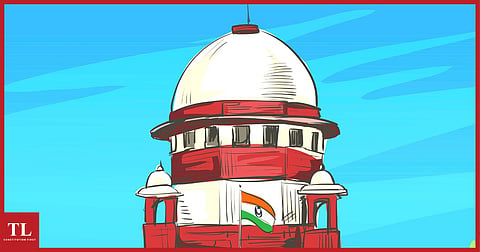

BY way of last opportunity, the Supreme Court on Tuesday granted three weeks' time to the Central Government to finalize a model community kitchen agreeable to all the state governments and the Union Territories. It said if any state government has any objections to the scheme to be formulated by the Centre, it would consider such objections on the next hearing.
The Court said that a welfare State's first responsibility is to "provide food to people dying due to hunger".
It also directed the state governments to attend the meeting to be organized by the Central Government in this regard and cooperate with the Centre to come up with a scheme on pan-India community kitchen.
At the outset, a three-judge bench comprising Chief Justice of India N.V. Ramana and Justices Surya Kant and Hima Kohli chided the Central Government over its affidavit.
"This affidavit does not indicate anywhere that you are considering framing a scheme. You are extracting information. It does not say what fund you have collected and what you are doing etc. We wanted a uniform model from the Centre. You have to ask the states. Not to collect information like police," the bench said.
It added, "You cannot ask for information which is already available. Do you conclude your affidavit saying you will consider the scheme now? There is not a whisper in your 17-page affidavit".
The bench also expressed displeasure at the affidavit filed by the officer of the rank of an Under Secretary to the Government of India. The bench directed that in future some responsible Officer of the rank of Secretary should file the affidavits in this matter.
On October 27, the apex court had directed the Centre to come up with the policy on community kitchen in coordination with the state and union territory governments.
The Court was considering Public Interest Litigation (PIL) that seeks directions for setting up of government-funded community kitchens to combat hunger, malnutrition and starvation deaths in the country.
Petitioners Anun Dhawan, Ishann Dhawan and Kunjana Singh told the apex court that the right to food is a fundamental human right well recognized under national and international law, which protects the right of people to access food.
They are being represented by advocates Fuzail Ahmed Ayyubi and Ashima Mandla.
"The right to food is interlinked to one's right to life and dignity and requires that food be available, accessible and adequate for everyone without discrimination or any inequality. Therefore, unavailability and lack of accessibility of food with adequate nutrition is thereby violative of Articles 14, 21, 38, 39, 47 and 51(c) of the Constitution of India," the petitioners have stated in their plea.
Citing the 2017 National Family Health Survey, the petitioners have informed the court that approximately 19 crore people in the country are compelled to sleep on an empty stomach every night.
The petition has stated that approximately 4,500 children die every day under the age of five years in the country due to hunger and malnutrition, amounting to over 3 lakh deaths every year.
Additionally, it has noted that 7,000 persons (including children) reportedly die of hunger every day, and over 25 lakh persons (including children) die of hunger annually.
The petition also draws attention of the court to the fact that while there are statistics available for malnutrition deaths of children and adults in the country, there is no official data available for death of persons owing to starvation.
It goes on to add, "the irony of the present situation is reflected by a group of activists who reported 56 deaths owing to starvation between 2015-2018, out of which 42 deaths took place between 2017-2018; while 25 of the 42 deaths were solely related to non-linking of Aadhaar with Ration Card or loss of Ration Card, with the highest deaths recorded in Jharkhand and Uttar Pradesh."
Referring to the Global Hunger Index 2018 report prepared by the Irish aid agency Concern Worldwide and the German aid agency Welthungerhilfe, the petition has pointed out that the study has ranked India at 103 out of 119 countries.
The petitioners have submitted, citing a report, that malnourishment is prevalent in the country even among adults, with 23 percent of women and 20 percent of men are considered undernourished in India.
The petition also referred to the concept of state-funded community kitchens running in some parts of the country. For instance, the petitioners cite examples of states such as Tamil Nadu (Amma Unavagam), Rajasthan (Annapurna Rasoi), Karnataka (Indira Canteens), Delhi (Aam Aadmi Canteen), Andhra Pradesh (Anna Canteen), Jharkhand (Mukhyamantri Dal Bhat) and Odisha (Ahaar Centre) which have been established with the object of combating hunger and malnutrition, providing nutritious food at subsidised rates to the lowest socio-economic strata of the society.
The petitioners have submitted that government-run community kitchens or community kitchens managed with funding from the State as well as under Corporate Social Responsibility, could be implemented to complement the existing schemes.